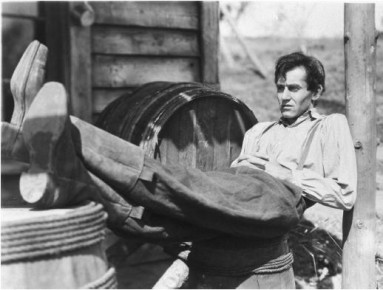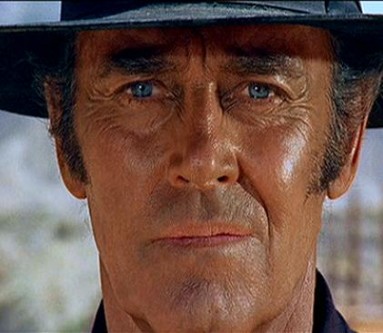Young Mr. Lincoln is one of the three movies John Ford made in 1939, and even though it begins and ends during Honest Abe’s time as young Springfield lawyer, the anachronistic term “prequel” is appropriate since the Civil War and Ford’s Theater retrospectively structure everything about the film’s narrative. Precisely because we know what will eventually happen, the film’s plot is never in doubt as such; we know that Abe will become a lawyer, we know that he will win his court case, we know that he will eventually best Stephen Douglas in the famous Lincoln-Douglas debates, that Douglas will hold his hat while he is inaugurated, that he will fight the civil war, free the slaves, and be shot and die.
There is therefore no narrative suspense, nor does the movie ever cheat and try to create any. Instead, there is a profound sense of doubt, and the incredible pathos the film refracts through Henry Fonda is both stunning and an opportunity to reflect on the difference between the uncertainty of a faked narrative suspense and a doubt that becomes existential (and much more interesting) precisely because nothing is in suspense.
After all, Fonda’s Lincoln seems to know exactly what his destiny is; the original script had a scene in which Lincoln converses with his disembodied destiny, and while Ford was right to cut it, it confirms my sense that Lincoln is supposed to always know who he is to become. Certainly we know. The opening titles are the imagined questions Lincoln’s mother would ask from the grave: “How is my son?” she poignantly begs; “How did he get on?” And in 1939, the “we” who would be watching those titles in a movie theater would have been well trained by the vast Lincoln-as-Martyr genre of hagiography to know the answer far more in terms of human tragedy than political triumph. Just as Lincoln shares with “us” the knowledge that he will one day be great, he also shares the knowledge that he will pay dearly for it. Most importantly, what he understands is that while he is free to fall, he is also sufficient to stand, and he will. Which means that this Lincoln is more like the Jesus of The Last Temptation of Christ in that he both knows himself to be human — and humanizes himself — by his fear to be what he is, and by his cynical understanding that his skill as an actor can substitute for the functionality of the character, in every important sense.
This is a subtle distinction, but an important one: he can be Lincoln, is smart enough and capable enough to fool all of the people all of the time into thinking he is a saint — in fact, he genuinely will play the role of a saint — but he isn’t, deep down, a saint. He is a fraud, simply a human being, a tremendously gifted one, but human. The point, then, is that he realizes that this will never matter: the fact that he is not as moral, as honest, and as “of the people” as even he himself would like to be is irrelevant to his ability to play that role in practice, and in practice is the only thing that matters in this cynical old world. He has the ability to play the role to absolute perfection, so it doesn’t matter that his true ruling trait is ambition; he might as well be the real thing, and so, for all extents and purposes, that’s what he is. And so, under the guise of an awesome aw-shucks folksiness—which he employs to manipulate everyone else in the film and uses as an alibi to hide from his destiny, in his early dialogues with Ann, especially at her grave—we see a man who’s not only unspeakably ambitious, but whose honesty inheres in seeing that because his ambition is really what drives him, the only way he can be what he has the capacity to be (and what the world needs him to be) is to keep that fact to himself and to live a lie.
The result is that, since he wants so desperately to be nothing more than a humble man of the people, the movie functions as one long demonstration that no such thing as “the people” exists. In contrast to Lincoln‘s own idealistic pronouncements, in fact—his cynical performance of a false identity—the America of the film is a country plainly run by the stupid and the mean, democracy not so much revealed as a sham as revealed as what happens when the ugly, stupid, and mean lump mass of the people as a whole take charge of their own affairs. Among the panorama of spiteful fools and vengeful simpletons who populate Springfield, only Stephen Douglas is worth taking seriously, but even he is only in the movie as a representative of the smarter and more powerful class of opponents with whom Lincoln will one day cross swords, in Washington. And while Lincoln bests him in the courtroom (by proxy), the stakes are negligible precisely because we are in a backwoods: Douglas’ reappraisal of his young political opponent is that of a chess player who has given away a pawn to test his opponent’s mettle, and therefore, perhaps, actually won the exchange. Douglas is not of Springfield, and he is a different caliber of opponent precisely because he is of Washington. In Springfield on the other hand — metonymic of the “real” America — we see nothing but rubes and fools, but authentic folks whose authenticity is a function of the naivete and vulnerability Lincoln does not share with them, but which he can perform so perfectly as to become what they essentially should have been.
Ford is not trying to demean “regular folks” or anything; he’s interested in the problem of greatness in a democracy, and in peeling away the self-serving populist imagination by which all Americans are above average and by which “we” rule “ourselves.” Lincoln’s hagiography tells us something true, but unspeakable, a bit of monarchicalism smuggled under a populist cover: he is able to represent the people only to the extent that he is not representative of them. Even he would like to believe in the mythology, but he cannot, it turns out, any more than Ford could. Instead, the responsibility of America’s great men is not to inspire the better angels of our human nature—because we don’t have them—but to manipulate us into doing what needs to be done, to tell lies so persuasively that we mistake them for truth, and in that way, they can actually come true. When he declares to his first audience, at his first political speech that “You all know who I am, plain Abraham Lincoln,” the double irony is that this is true and untrue: he is working to become that, to become the plain Abraham Lincoln which would be worthy of their trust, but he’ll have to lie and deceive to do so, and they’ll never see through the deception that makes it true.
This is Ford’s cynicism, the cynicism of the filmmaker who prints the legend even knowing (and showing) its essential falsity. Occasional forays into populism likeThe Grapes of Wrath notwithstanding, Ford had a gentle affection for ordinary people — and never contempt — but he was haunted by an inability to believe in their common divinity in the ways that the Steinbeck of Grapes did. A movie like How Green Was My Valley, therefore, shows us the delusion of such thinking, while Tobacco Road shows us the comedy of a human frailty whose true tragedy could never be fathomed by its own protagonists. And even movies like Doctor Bull or Judge Priest are drenched with the sense that the community has to be saved from itself (and, again, by a folksy con-man smart enough to know his own human frailty, and, therefore, to do what needs to be done in spite of it).
Like Will Rogers’ incarnations in those movies, then, Fonda’s Young Mr. Lincoln is also a folksy con-man. But he is also more: as a Christ figure, he is a Calvinist or Catholic one and his grace is given to a community that cannot deserve it (or even understand it). But unlike Doctor Bull or Judge Priest — who live peacefully with their own imperfections — Abraham Lincoln is called to actually be perfect, to go beyond the backwoods and inhabit the citadel of American democracy itself. His is therefore a different kind of tragedy, a different kind of pathos. A fraudulent Jesus, but a necessary one, he realizes that he can play the role only by making the deception so perfect that he loses himself in it, the kind of martyrdom in which he ceases to be human by becoming a myth. And he has to be martyr, because if he's anything else, he become a tyrant. If he isn't perfect, democracy will fail.
The Young Mr. Lincoln was made well before the first stirring of the civil rights movement, in the midst of a period of white populism which Ford had interesting things to say about, but which he did not transcend, and did not try to transcend. And so, it’s not surprising that African-Americans are striking by their total absence from the film. When the first piece of law that the young Abe Lincoln reads—in the mythological “reading by firelight” scene—is on a man’s liberty to own property, he can sit and marvel at its transparent self-evident truth status, precisely because there are not, yet, any black people to muddy the waters. The problem of man as property, the question of people’s claims to own other people, has not yet emerged for him, and this film will not allow it to emerge, cannot allow it to emerge. If it did, after all, it could not think about democracy in the ways it wants to. It would be impossible to take its existence for granted, and worry about its future in a Tocquevillian vein; he would have to address its status as not-yet project, a different set of ideological illusions altogether.
Instead, the movie makes racial purity into the object of a pastoral nostalgia: since we’re all aware of the hidden significance of those words about property — in ways that Henry Fonda is pretending not to be — the film’s wish fulfillment fantasy is for an uncomplicated world before black people muddied the glories of an ownership society, where something like rights to property could still be the kind of uncomplicated first principle that libertarians delude themselves into thinking it is. To hear this Abe Lincoln tell it, his family left Kentucky not to get away from slavery as a system, but to get away from the slaves themselves: Kentucky’s a mighty fine place to live, he says, “but with all the slaves coming in, white folks had a hard time making a living.” So, he moved north. Dark skinned immigrants were pushing down a white man’s wages, you see; populist economics has trumped race.
In David Blight’s great book on popular civil war memory, he makes the point that national reconciliation (and the rolling back of reconstruction) was a project of misremembering the causes of the civil war, in which issues like the citizenship of black people were comprehensively forgotten and slipped under the radar. Instead of focusing in on the basic issue that still divided the country, therefore, people like Horace Greeley retrospectively recast the conflict as having been caused by hot tempers and misapplied patriotism, and not by slavery at all. In sharp contrast to the ways that Lincoln reluctantly, but firmly, made slavery the central issue in his second inaugural address, therefore, post-bellum reunification proceeded only after slaves and freedmen had been erased from the historical narrative, after the north turned its military victory into a political defeat and allowed the South to re-establish a violent racial hierarchy familiar in its outlines if not exactly the same as slavery, a transcendence of partisan bickering by the renunciation of principle that would have made today’s congressional Democrats stand and salute.
Ford’s own diabolically strange The Prisoner of Shark Island had done something similar only three years earlier, replaying and re-mixing the civil war in order to resolve its aftermath: in that film, the firing on Fort Sumter is reincarnated as the very act by which Mudd, a confederate scapegoat wrongfully blamed for killing Lincoln, can be re-admitted into the union: in the dream logic of this film, it turns out that only he can order the recalcitrant black soldier to do what needs to be done. Only southerners, you see, have the necessary knack of command, so as freed slaves are re-cast as the divisive factor that must be overcome if the union is to be reborn, the special talent that a white Virginian brings to the table is what allows him to file for citizenship: command and control of black people.
Along with Judge Priest, Shark Island is the high point of Ford’s revisionist white populism; the civil rights movement would leave its mark on him, and he would at least try to address the issue of race with some of the insights his later self would acquire. But in The Young Mr. Lincoln, he’s still working from the earlier ideological playbook, and the problem of containing and regulating overzealous enthusiasm (and out of control rough-and-tumble democracy) is the central problem. Abe Lincoln therefore strides forth not as a steadfast man of principle but as a kind of “Great Mediator” whose folksy ways, gentle humor, and willingness to use violence can solve every disagreement. From a pie-eating contest to his law practice, Lincoln’s principles are far less important than his Solomon-like ability to broker compromise: instead of compromise, everyone magically comes away satisfied whenever Abe Lincoln hands forth a decision.
It’s exactly right, therefore, that the film’s central event must be Lincoln’s prevention of a lynching of white people by white people. In a movie made at a time when the Ku Klux Klan was a political force, and when the lynching of black people in the South was not only common but was becoming a national scandal, the inextricable racial element in the practice of lynching has been extricated, exactly as the centrality of slavery in the civil war had to be forgotten in post-bellum mythologies of The Lost Cause. In this movie, therefore, rebellion gets reframed as a problem of keeping public order, not of resolving a real dispute, and the man who is the man for the job is a guy who plays Dixie on his Jews Harp (called that because of David’s harp, he informs us). When his companion notes that the song makes you want to march, he simply muses; imperturbable, the young Mr. Lincoln keeps his passions in check, and because he can, he succeeds in keeping the passions of Springfield’s overzealous citizenry in check as well.
When the time comes, then, he will be a Solomon. A man is dead, and two brothers stand accused of killing him. Neither will speak, so after Lincoln stops a mob from lynching them, he becomes their attorney. And when the prosecution offers him the choice of letting one brother live and one brother die (if one will confess, the other can go free) he makes the inexplicable choice to go for broke, risking all in the effort to save them both. Like Solomon, who offered to let the baby be cut in half and in doing so became famous—and like President Lincoln, who preferred war to sacrificing the South—this young Mr. Lincoln refuses the choice, saves them both, and everybody is happy. There are no losers here, because the problem of race has been erased from the movie before it began. And, as a fitting coda, his accomplishment wins him the attention of a young southern belle named Mary Todd, who tells him she admires his conduct during this recent “deplorable uprising.” Indeed.


